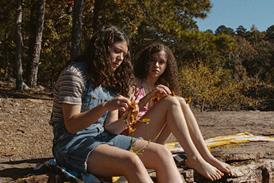Screened at Berlin (Competition). Dir: Catherine Breillat. France-Italy. 2001mins.
No European director, and certainly no female European film-maker, has made a more audacious series of films than Catherine Breillat. There are times, in fact, when she seems to court controversy. In this respect, Fat Girl carries on where Romance left off.
Fat Girl is a bold study of two young sisters who are close to each other, but who are also capable of an extremely ferocious relationship. The film reserves its coup de theatre for a final violent scene that once again seems to divide audiences.
The younger of the sisters is 12-year-old Anais (Reboux), a plump pre-adolescent with the mind of a child and the desires of an adult. Elena (Mesquida), the elder sister, is everything Anais isn't Ñ she's pretty, sexy and a magnet for any young man who crosses her path. The sisters are on holiday by the sea with their parents and a young Italian (de Rienzo) soon spots Elena. Anais becomes the spectator of the resulting affair, locked in the same bedroom with the lovers and wondering when, if ever, she will lose her virginity in the same manner.
It soon becomes apparent, however, that the Italian boy is using Elena and that the object of desire is just that: someone to be taken and then left. All the while, Anais eats and eats, and then swims up and down the pool creating fantasies of her own. She is convinced she is ultimately the better of the two and will one day prove it. Besides, she knows exactly what is happening and the likely result. Even so, she loves her sister and the two are clearly viewed by Breillat as 'a soul with two bodies'. This view is not shared by the girls' parents, who regard Anais as the 'difficult' one and seem to delight in taking it out on her even when it is her elder sister Elena who has offended.
All this is excellently done by a filmmaker who has a better line into the hearts and minds of young people and their parents than most, and it is made the more convincing by performances from Reboux and Mesquida that ring absolutely true. Reboux, in particular, is astonishing, making us not only feel for her, but also realise that she is very likely to be the ultimate victor in the unspoken battle between the two girls.
What happens in the last few minutes of the film, after a long journey towards home on the motorway, is the kernel of the drama, but it wouldn't be fair to divulge much of it. Suffice to say that the violence that suddenly envelops the family provides us with a final clue as to the psychology of Anais that you either accept or not.
Apart from this ending, there is nothing in the film to cause a great deal of controversy, except perhaps the age of the girl actors, which appears to be the same as in the film Ñ a fact that could clearly be a difficulty in some territories. But Breillat has surmounted a great many hurdles before and in the end triumphed. She is without question an intelligent and talented film-maker working in areas many others scarcely dare to tread without compromise. And whatever you think about Fat Girl, it is yet another Breillat film that is impossible to ignore.
Prod cos: Flach Film, CB Films, Arte France, Cinema Immagine and Urania Pictures with the participation of Canal Plus and the Centre National de la Cinematographie. Int'l sales:Flach Pyramide International. Prod: Jean-Francois Lepetit. Scr: Catherine Breillat. Cinematographer:Yorgos Arvanitis. Prod des:Francois Renaud. Ed:Pascale Chanvance. Main cast: Anais Reboux, Roxane Mesquida, Libero de Rienzo, Arsinee Khanjian, Romain Goupil, Laura Betti, Albert Goldberg


















No comments yet